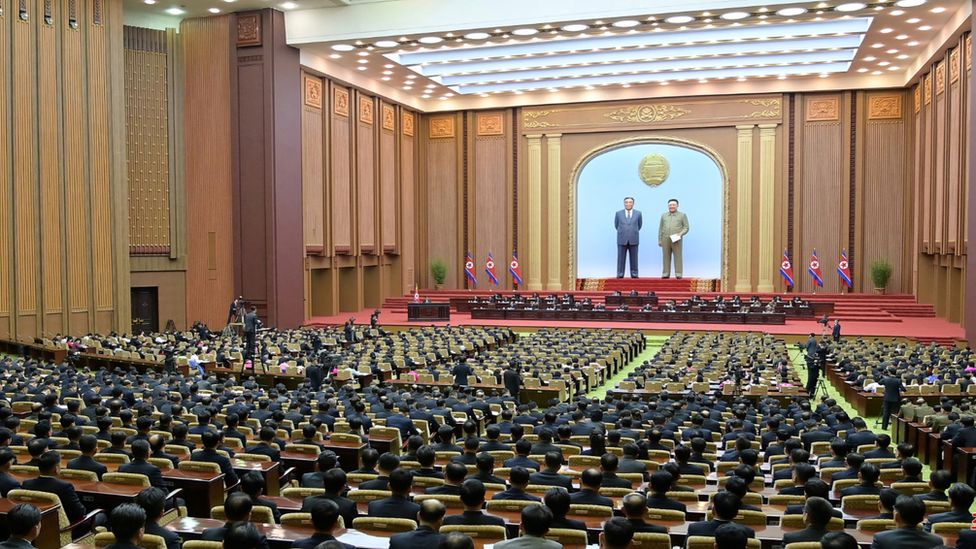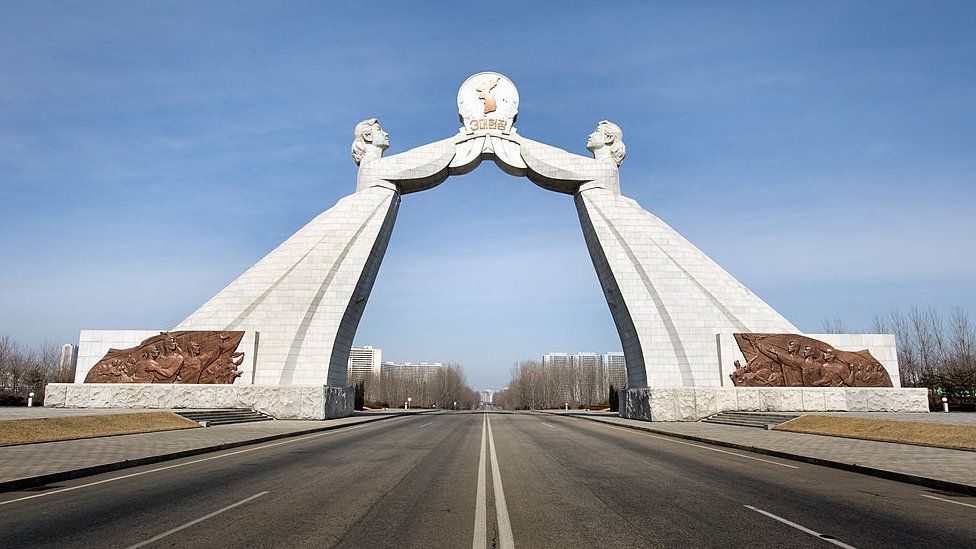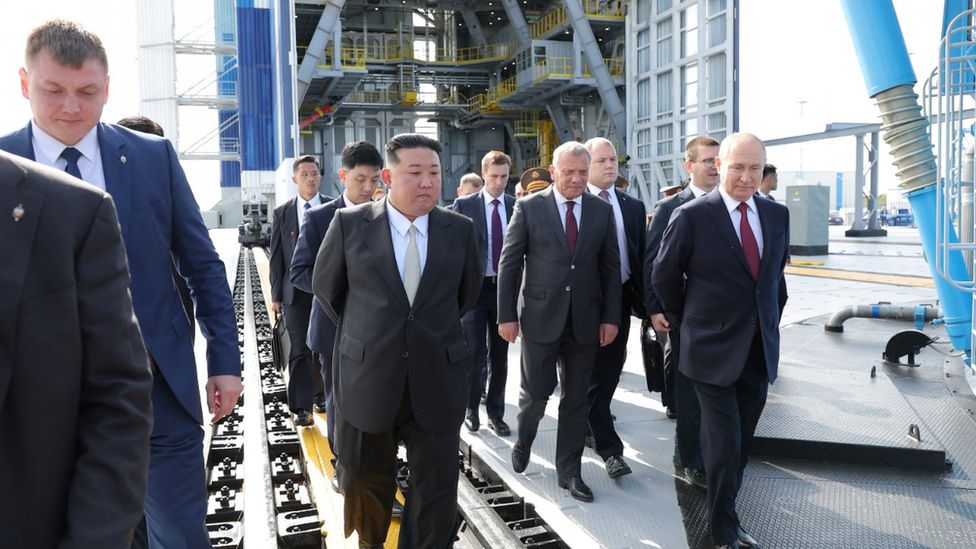Is North Korea's leader actually considering war? Analysis by BBC
The BBC's recent analysis examines the opinions of various experts on North Korean leader Kim Jong-un's intentions to start a war with South Korea.
North Korean experts - by nature, a cautious group who seek to avoid sowing panic - have been left reeling by two of their own.
Last week, the two eminent analysts dropped a bomb - so to speak - in stating their belief that the pariah state's leader is preparing for war.
Kim Jong Un has scrapped the bedrock goal of reconciling and re-uniting with South Korea, they said. Instead, he's presenting the North and South as two independent states at war with each other.
"We believe, that like his grandfather in 1950, Kim Jong Un has made a strategic decision to go to war," wrote Robert L Carlin, a former CIA analyst and Siegfried S Hecker, a nuclear scientist who's visited the North several times, in an article on specialist site 38 North.
Such a pronouncement set off alarm bells in Washington and Seoul, and a massive debate in North Korea watching circles.
Most analysts, however, disagree with the war theory; the BBC spoke to seven experts across Asia, Europe and North America - none of whom supported the idea.
"Risking his entire regime on a potentially cataclysmic conflict is not on-brand for the North Koreans. They have proven to be ruthlessly Machiavellian," says Christopher Green, a Korea watcher from Crisis Group based in the Netherlands.
He and others note the North often acts out to bring Western powers to the table for dialogue; and there are political pressures at home too.
But they do agree that Mr Kim's increased bluster can't be ignored and his regime has grown more dangerous.
While most argue war may still be unlikely, some fear a more limited attack could yet be on the cards.

What has led to this?
Close watchers of North Korea's Kim Jong Un are used to his nuclear threats, but some say the latest messages from Pyongyang are of a different nature.
Six days on from his New Year's Eve declaration that "it is fait accompli that a war can break out anytime on the Korean peninsula", his military blasted artillery across the border.
North Korea has also claimed a test of a new solid-fuelled missile, and its underwater attack drones, which can supposedly carry a nuclear weapon, since the start of January.
They follow on from two years of near-monthly missile launches and weapons development in blatant contravention of UN sanctions.
However, it was his announcement of formally abandoning the goal of unification that last week furrowed brows.
Reuniting with the South had always been a key - if increasingly unrealistic - part of the North's ideology since the inception of the state.
"This is a big deal. It fundamentally alters one of the regime's core ideological precepts," says Peter Ward, a senior researcher at Kookmin University in Seoul.
Kim Jong Un would now be tearing down that legacy - literally. Along with shutting diplomacy channels and cross-border radio broadcasts, he has announced he will demolish the Reunification Arch, a nine-storey monument on the outskirts of Pyongyang.
The arch, showing two women in traditional Korean dress reaching towards each other, had been built in 2001 to mark his father's and grandfather's efforts towards the goal of reunification.

Satellite pictures released by Planet Labs on Tuesday appear to show the arch may already have been destroyed, although there's no official confirmation of this.
Kim Il Sung had been the one who went to war in 1950, but he was also the one who set the idea that at some point North Koreans would be united with their southern kin again.
But his grandson has now chosen to define South Koreans as different people altogether - perhaps to justify them as a military target.
A limited strike on the cards?
Mr Carlin and Dr Hecker, the analysts who predicted war, have interpreted all of this as signs that Kim Jong Un has settled on actually pursuing a fight.
But most analysts disagree. Seong-Hyon Lee, from the George HW Bush Foundation for US-China relations, points out the country is due to reopen to foreign tourists next month, and it has also sold its own shells to Russia for war - something it could ill afford if it were preparing for the battlefields.
The ultimate deterrent, however, is that were the North to launch an attack, the US and South Korean armies are just so much more advanced.
"A general war could kill a lot of people in the South, but it would be the end of Kim Jong Un and his regime," says Kookmin University's Mr Ward.
Instead, he and others warn the conditions are building for a smaller action.
"I'm much more concerned, in general, about a limited attack on South Korea… an attack of that sort would take aim at South Korean territory or military forces but be limited in scope," says analyst Ankit Panda, from the Carnegie Endowment for International Peace.
This could even be in the form of shelling or attempted occupation of contested islands west of the Korean peninsula.
In 2010, the North struck the island of Yeonpyeong killing four South Korean soldiers, infuriating the South.
A similar provocation again could be done to test South Korea's limits, analysts suggest, and to push the buttons of President Yoon Suk Yeol, a defiantly hawkish leader who has vowed to respond to a North Korean attack with punishment "multiple times more severe".
"North Korea may expect to draw out a disproportionate retaliatory attack from Seoul," says Mr Panda, something that might spark a broader escalation in fighting.
Playbook move for leverage
Others say war fears should also be put in the context of Kim's operating patterns.
"Looking at the history of North Korea, it has often used provocation to attract the attention of other countries when it wants to negotiate," says Seong-Hyon Lee.
The regime continues to suffer from economic sanctions and 2024 is an election year for its enemies - with the US presidential vote and South Korean legislature poll.
"This presents a good opportunity for Kim Jong Un to provoke," explains Dr Lee.
The current US administration under President Joe Biden - tied up with Ukraine and Gaza - hasn't paid North Korea much heed and Pyongyang has also typically had most engagement with Republican administrations.
Kim Jong Un and Donald Trump famously had a bromance in 2019 before the denuclearisation talks soured - and the North Korean leader may be waiting for the former US president to return to the White House, where he might weaken the alliance with South Korea and be open to dialogue again.
North Korea's closer friendship with Russia and continued economic support from China in the past year may have also boosted its audacity, analysts suggest. It's received technical help from Russia to achieve a long-term goal of launching its spy satellites and the two states had several high-profile meetings including a leaders summit last year.

"Much of what we're seeing is a result of broader North Korean confidence in its own capabilities and its geopolitical position given Russian, and to a lesser degree, Chinese support," says Mr Panda.
Domestic goals
And others say Kim Jong Un's behaviour is all aimed at stabilising his own regime.
"This appears to be an ideological adjustment for regime survival," argues Professor Leif-Eric Easley from Ewha University in Seoul. "North Koreans are increasingly aware of their Communist country's failings compared to the South."
He suggests a policy focused on defining the enemy is intended to justify Mr Kim's missile spending during a difficult time. There are reports of starvation across the country.
Presenting the South as the enemy also makes it easier to resolve "cognitive dissonance at the heart" of the North's view on South Korea, points out Mr Ward.
"Previously it was an indelibly evil state that was supposed to be the object of unification with a hopelessly corrupting culture that should not be consumed under any circumstances but with people who need to be liberated from their evil government," says Mr Ward.
"Now the country and its culture can just be branded evil and that justifies the continued crackdown on South Korean culture."
"He doesn't actually want a war - a huge gamble where he would have nothing to gain and everything to lose", says Sokeel Park, from Liberty in North Korea, an NGO helping North Korean refugees.
His threats are instead aimed at cementing his new North and South policy, designed ultimately to shore up his power at home, he says.
While it's important for South Korea, the US and allies to prepare for the worst-case scenario, it is also worth a thorough examination of the internal situation in North Korea and the wider geopolitics, analysts say.
At the end of the day, the best way to find out what the North's leader is thinking is to engage with him, argues Dr Lee.
"The international community does not see the US talking to Kim Jong Un as surrendering to Kim Jong Un's threats. It is seen as a necessary means to achieve a goal," he says.
"If necessary, one should consider meeting with the leader of an enemy nation to reduce misjudgements and prevent war."








